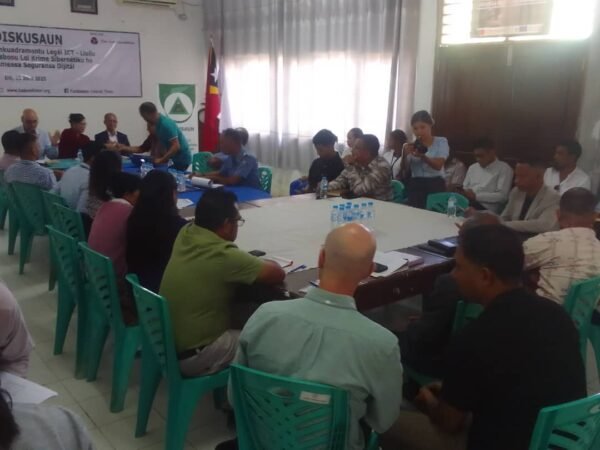Dili, April 18, 2025 (Média Democracia) – The Hadomi Timor Foundation (FHT), together with its development partners, held a discussion on the draft Cybercrime Law at the forum hall of the Non-Governmental Organization Network of Timor-Leste (FONGTIL). The activity took place at the FONGTIL building in Caicoli, Dili, this Tuesday.
The Executive Director of Hadomi Timor Foundation, Abrão Monteiro, stated that the foundation initiated this discussion with partners because many members of the public are concerned about the draft law, especially the perception that it may limit freedom of expression and the right to use social media.
“Hadomi Timor Foundation initiated this discussion because we know the draft Cybercrime Law has been in development since 2021 and continues to raise public concerns. The introduction of the Cybercrime Law has made people think that it aims to limit freedom of expression, especially regarding the right to use social media and digital platforms. Therefore, this discussion was held to listen directly to the Ministry of Justice and PCIC during the handling of investigations based on complaints from the public, especially those related to crimes committed online,” said Abrão Monteiro.
He further explained that the discussion also aimed to analyze certain articles that potentially threaten freedom of expression and human rights, particularly those that could restrict IT professionals from conducting security tests and system vulnerability assessments to inform relevant parties and strengthen cyber security.
“We also identified many gaps in the draft Cybercrime Law, as some articles mention data protection based on the Data Protection Law, which has already been approved, but in reality, the law is not yet in place, even though it is referenced in the draft. So we are recommending to both Parliament and the Government to carefully review these articles,” he added.
He stated that the draft law is still under parliamentary discussion and that the collection of public opinions is essential because the law is intended to protect society and hold individuals accountable for unauthorized use and threats to private data that could damage public service systems.
“This law has taken a long time to process, so we initiated discussions to strengthen recommendations and coordination among stakeholders before the draft enters Parliament for deeper discussion. Because those in Government and Parliament are not permanent, this law must serve all citizens and cannot only be shaped by the current authorities, as they will eventually return to being ordinary citizens and could become victims of the very same law,” he emphasized.
He also mentioned that the discussion invited representatives from the government, including the Ministry of Justice, PCIC, DSIC, PNTL, civil society organizations, and some international agencies to jointly develop ideas and present technical recommendations to Parliament and the Government, ensuring that the law is fair and transparent.
Furthermore, he stressed the hope that any law should remain aligned with the fundamental rights enshrined in the RDTL Constitution, especially those relating to freedom of expression under Articles 40 and 41. The draft, as it stands, shows potential risks of restricting freedom of expression. For example, Article 21 addresses illegal access, communication fraud, and computer fraud using general terms, and such vague language could be misused by leaders to limit freedom of expression, especially under defamation accusations. FHT sees this as a potential risk that could result in data privacy violations and other cases.
Reported by : Nelfiano
Photo by : Nelfiano

